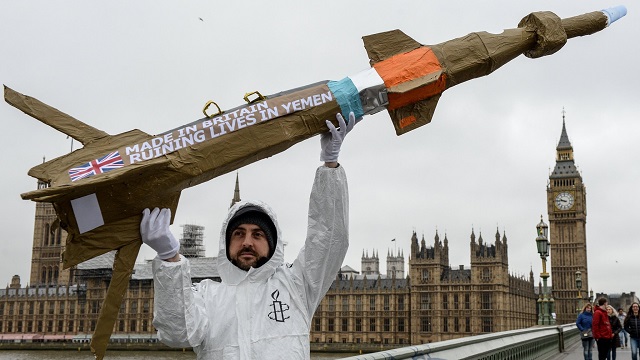“We are doing the right thing for the right reasons”: A view from inside Europe’s biggest arms company Special Report
New in Ceasefire - Posted on Thursday, May 18, 2017 14:14 - 0 Comments
By Andrew Smith

Activists march in London against UK arms sales to Saudi Arabia, carrying replicas of missiles currently used by Saudi Arabia’s UK supplied Eurofighter Typhoon war planes. (Photo: Chris Ratcliffe/Getty Images)
“If I did not sincerely believe that we are doing the right thing for the right reasons then I would not be the Chairman of this company.”
The tone was righteous and heartfelt, but the cause was not. These were the words of Sir Roger Carr, the Chair of BAE Systems, when challenged by shareholders on why his company saw fit to export fighter jets to Saudi Arabia for use in the ongoing bombardment of Yemen.
It is not a bombing campaign we read a lot about, despite it having lasted for over two years and having killed more than 10,000 people. Schools, hospital, homes and even funerals have become the sights of massacres as Yemeni people have been dragged into a humanitarian crisis. It’s no wonder that many refer to it as the ‘forgotten war’, although for the people on the ground the horror is all too real.
BAE has profited every step of the way from the conflict, with its Tornado and Typhoon fighter jets used right from the start. As I write this, they are in negotiations to sell even more aircraft. Where aid organisations and NGOs have responded to a terrible catastrophe, arms companies like BAE have seen a business opportunity. We saw this in Theresa May’s trip to the Kingdom last month, where helping flogging BAE weaponry was a significant theme.
Regret was not the order of the day though. Contrary to the vast majority of the evidence, a picture was painted of Saudi Arabia as a modernising and liberalising state in transition. We were patronisingly told that it is “liberalising at a pace that it can manage in the culture from which it comes from”, and reassured us that it was a ‘defender’ and not an ‘aggressor’ on the world stage.
Little was said about the terrible daily repression Saudi people face at home, where women have minimal rights and citizens can be sentenced to death for such ‘crimes’ as atheism and ‘witchcraft’, or the destruction that has been unleashed on Yemen. But why would it be? Turning a blind-eye to atrocities is what keeps the money rolling in.
The event itself was a dispiriting exercise in bluff, bluster and evasion. Taking place in a cold and sterile airbase in Farnborough, the AGM is the one time of the year that BAE is legally obliged to open itself up to the scrutiny and questioning of the public – or at least those of us who are prepared to buy shares in order to ask them questions.
There was an almost Orwellian touch to proceedings, with board members of Europe’s biggest arms company constantly telling us that ‘nobody benefits from war’; a claim which ignores the somewhat inconvenient fact that BAE is a company whose entire business model is based on maintaining the perpetual threat of war and conflict.
One point Carr was right about is that arms companies can only get away with the things they do because the government pulls out all the stops to help them do it. Time and again, Carr stressed that BAE does not make political judgements and that its allies are whoever the UK government says they are. In other words, dictatorships can be your friends as long as government ministers and civil servants approve.
The superficial and evasive claims of political neutrality ignore the millions of pounds that BAE spends on lobbying and trying to influence governments and politicians at home and abroad. Yes, the government is absolutely complicit in their actions, but no company can simply outsource its moral compass to Whitehall.
To Carr and his colleagues, human rights abuses and conflict are an inevitable side-effect of international relations. The repression and death that weapons cause is merely collateral damage in the maintenance of peace and stability, a peace and stability that can only come to be through even greater militarism and the sale of even more weapons. Everybody has weapons, the logic goes, so the bigger the weapons the safer you are.
Upon making my way back to Farnborough train station (with a BAE-provided vegetarian packed-lunch in hand), I couldn’t help but feel like I was stepping out of a dystopian, surreal and extremely cynical world.
Theirs is a world-view in which arming tyrants can bring peace and equality, and where the human consequences of war have nothing whatsoever to do with the weapons that are used or those who provide them.
They want the rest of us to ignore what they do and go back to our daily lives. All the while they will continue to tell themselves that they are striving for peace and making the world a little bit safer, one arms sale at a time.
See Also:
Special Report | What was Theresa May actually doing in Saudi Arabia? And who was she doing it for?
Politics | The UK Government must end its shameful complicity in the destruction of Yemen
Comment | This victory shows we can, and must, shut down the DSEI arms fair for good


Leave a Reply